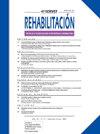针对中风患者的 Mini-BESTest 平衡评估系统量表的跨文化调整
IF 0.4
Q3 Medicine
引用次数: 0
摘要
本研究的目的是将 "平衡评估系统(Mini-BESTest)"评估量表改编成智利西班牙语,使其适用于中风患者。由于中风是一种损害患者平衡能力的综合症,而平衡能力是安全进行日常生活活动的基本能力,因此研究不同的替代方法以改善患者的生活条件被认为是至关重要的。研究过程包括六个阶段:直接翻译、翻译综合、回译、作者认可、预试和最终共识。在预试中,将改编后的量表应用于接受康复治疗的中风患者样本,这些患者能够自行站立、行走并听从简单的指令。结果将迷你贝斯特评估量表改编为智利西班牙语的跨文化改编过程圆满完成。互测信度的一致率超过 92%,且均具有统计学意义,这表明一致率达到了极高的水平。有一种趋势表明,亚急性患者需要重复更多的指令。这些发现为继续验证量表提供了可能性。建议对亚急性中风患者进行重复指导。本文章由计算机程序翻译,如有差异,请以英文原文为准。
Adaptación transcultural de la escala «sistema de evaluación del equilibrio» (Mini-BESTest) en pacientes con accidente cerebrovascular
Objective
The purpose of this study is to adapt cross-culturally to Chilean Spanish the assessment scale “Balance Assessment Systems (Mini-BESTest)” so that it can be applied to patients with stroke. Since stroke is a syndrome that compromises the patient's balance, an essential ability to perform activities of daily living safely, the study of different alternatives to improve the living conditions of patients is considered essential.
Materials and methods
Observational, descriptive, cross-sectional study. The process consisted of six stages: direct translation, translation synthesis, back translation, author approval, pre-test, and final consensus. In the pretest, the adapted scale was applied to a sample of stroke patients receiving rehabilitation therapy, who were able to stand up on their own, walk, and follow simple instructions.
Results
The process of cross-cultural adaptation to Chilean Spanish of the Mini-BESTest evaluation scale was satisfactorily completed. Interrater reliability obtained percentages of agreement greater than 92% and all were statistically significant, which suggests an excellent level of agreement. There was a trend for subacute patients to require a greater repetition of the command.
Conclusions
Mini-BESTest shows an excellent level of agreement among physiotherapists. These findings offer the possibility of continuing with the validation process of the scale. It is suggested to repeat the instructions to patients with subacute stroke.
求助全文
通过发布文献求助,成功后即可免费获取论文全文。
去求助
来源期刊

Rehabilitacion
Medicine-Rehabilitation
CiteScore
0.80
自引率
0.00%
发文量
63
期刊介绍:
La revista que es desde hace más de 40 años la publicación oficial de la Sociedad Española de Rehabilitación y referente de la mayoría de las Sociedades de la Especialidad de los países americanos de habla hispana. Se publican 5 números pluritemáticos al año y uno monográfico sobre un tema del mayor interés y actualidad designado por el consejo de redacción.
 求助内容:
求助内容: 应助结果提醒方式:
应助结果提醒方式:


